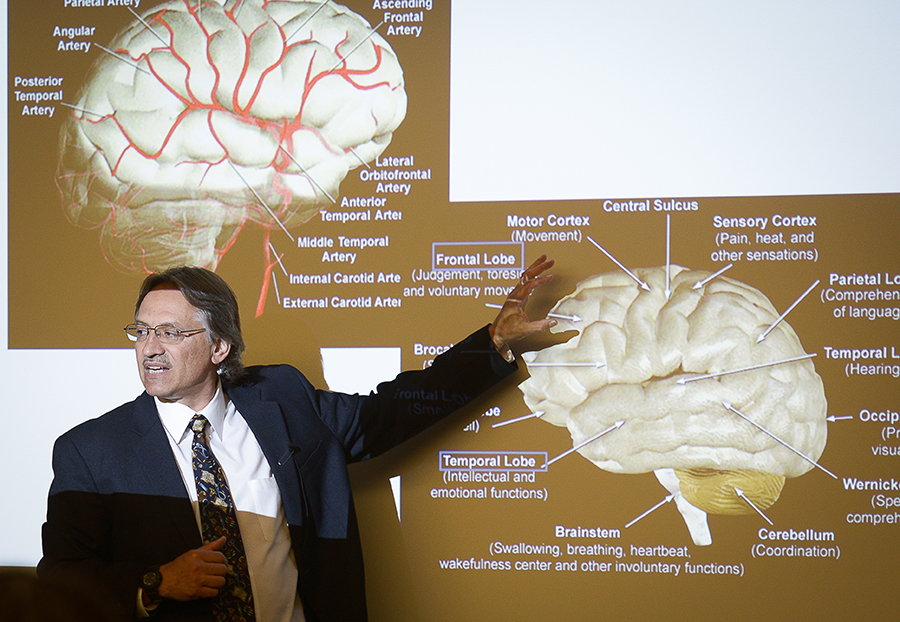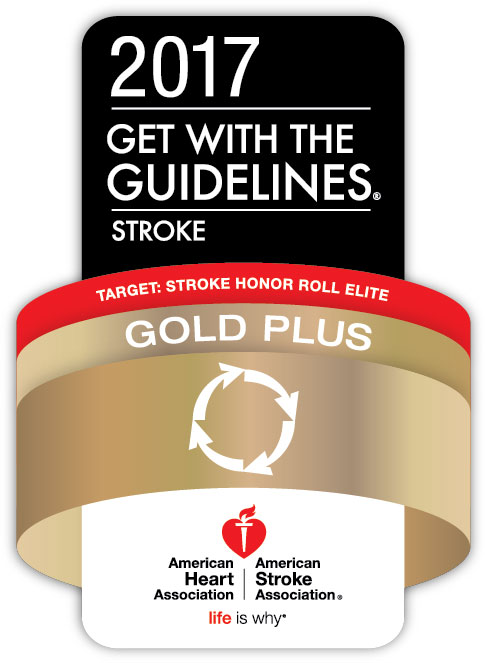
Primary Stroke Center
Arrowhead Regional Medical Center (ARMC) is certified by the Healthcare Facilities Accreditation Program (HFAP) as a Level 1 Primary Stroke Center. Our multidisciplinary team approach to delivering excellent stroke care has earned us the HFAP Seal of Excellence. This means that ARMC has the capacity to stabilize and treat acute stroke patients, provide acute care, administer tissue plasminogen activator (tPA) and other acute therapies safely and efficiently.
What is a Stroke?
A stroke happens when blood flow to the brain is blocked by a blood clot in a brain artery or because a brain blood vessel has burst. Stroke symptoms include headache, mental confusion, inability to speak, loss of consciousness and paralysis. When a stroke occurs, part or all of the brain is deprived of oxygen. Without oxygen, affected nerve cells in the brain stop functioning and begin to die within minutes. A stroke is a medical emergency. Stroke affects approximately 795,000 people each year in the United States and is a leading cause of serious, long-term disability.
 Dan Miulli, D.O., F.A.C.O.S.
Dan Miulli, D.O., F.A.C.O.S.
ARMC Stroke Program Director
Stroke Treatment
In 1996, the Federal Drug Administration (FDA) approved the use of a new drug called tissue plasminogen activator, or tPA, to treat stroke. tPA is classified as a thrombolytic drug which works to dissolve a clot or obstruction in the bloodstream. The time window for getting the best results from thrombolytic drugs is three hours from the initial symptom onset. The result is far less brain tissue damage. Therefore, time is of the essence when treating stroke. If you, a loved one or friend is experiencing stroke symptoms, call 9-1-1 immediately.
F.A.S.T. is an easy way to remember the sudden signs of stroke. FAST is:
Face Drooping: Does one side of the face droop or is it numb? Ask the person to smile. Is the person’s smile uneven?
Arm Weakness: Is one arm weak or numb? Ask the person to raise both arms. Does one arm drift downward?
Speech Difficulty: Is speech slurred? Is the person unable to speak or hard to understand? Ask the person to repeat a simple sentence such as, “The sky is blue.” Is the sentence repeated correctly?
Time to call 9-1-1: If someone shows any of these symptoms, even if the symptoms go away, call 9-1-1 and get the person to the hospital immediately. Check the time so you’ll know when the first symptoms appeared.
What’s New?
 ARMC was recognized with the American Heart Association/American Stroke Association’s Get With The Guidelines®-Stroke Gold Plus Quality Achievement Award with Target: StrokeSM Honor Roll Elite. The award recognizes ARMC’s commitment to providing the most appropriate stroke treatment according to nationally recognized, research-based guidelines based on the latest scientific evidence. To qualify for the Target: Stroke Honor Roll Elite, ARMC met quality measures developed to reduce the time between the patient’s arrival at the hospital and treatment with the clot-buster tissue plasminogen activator, or tPA, the only drug approved by the U.S. Food and Drug Administration to treat ischemic stroke. If given intravenously in the first three hours after the start of stroke symptoms, tPA has been shown to significantly reduce the effects of stroke and lessen the chance of permanent disability.
ARMC was recognized with the American Heart Association/American Stroke Association’s Get With The Guidelines®-Stroke Gold Plus Quality Achievement Award with Target: StrokeSM Honor Roll Elite. The award recognizes ARMC’s commitment to providing the most appropriate stroke treatment according to nationally recognized, research-based guidelines based on the latest scientific evidence. To qualify for the Target: Stroke Honor Roll Elite, ARMC met quality measures developed to reduce the time between the patient’s arrival at the hospital and treatment with the clot-buster tissue plasminogen activator, or tPA, the only drug approved by the U.S. Food and Drug Administration to treat ischemic stroke. If given intravenously in the first three hours after the start of stroke symptoms, tPA has been shown to significantly reduce the effects of stroke and lessen the chance of permanent disability.